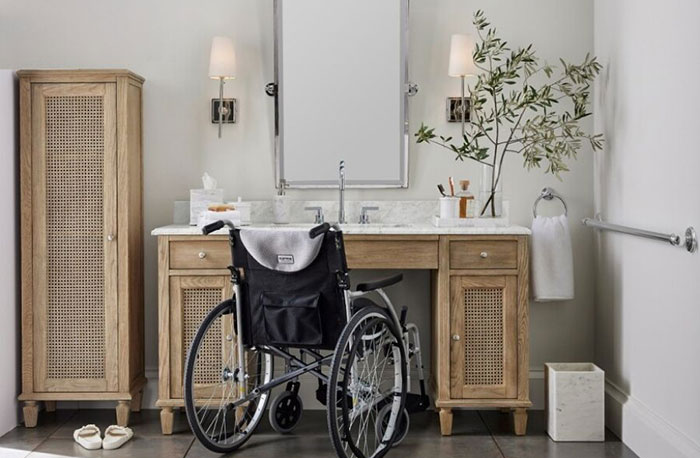Pottery Barn Debuts Accessible Home Collection

August 9, 2022
Pottery Barn announced the fall launch of a new accessible furniture collection called Accessible Home. Designed to be usable by the elderly, the injured and those living with disabilities, the selection samples from more than 150 of Pottery Barn’s best-selling products and alters them in ways that have made them either accessibility focused or ADA compliant while still maintaining the pre-existing aesthetic of the company.
The Accessible Home Collection Answers a Long-Stated Need
“In our ongoing commitment to enhance the quality of lives at home, we’re excited to now better serve our customers’ specific needs with The Accessible Home,” said Marta Benson, Pottery Barn president. “Our mission is to incorporate accessibility into everything we do—providing beautiful, thoughtful design that makes a home a more comfortable place for everyone.”
The announcement makes Pottery Barn one of the first major home brands to create such a line of products, and it already has plenty speculating on what is to come from the rest of the home furniture industry, especially as experts continue to forewarn the impending surge of elderly Americans who wish to live at home. At the very least, it is a clear indication from the brand that it might make good business sense to design more inclusively.
More than 150 Accessible Products Join the New Collection with More on the Way
The Accessible Home line pulls from more than 150 of Pottery Barn’s best-selling styles, including products for the bathrooms, office, living room, bedroom and rooms. These products also range from standard furniture, such as desks and tables, to more specialized products like grab bars, pivot mirrors and motion lift chairs.
To make the changes, the company brought in experts from the Disability Education and Advocacy Network (DEAN), a cross-disability organization led by those with disabilities and designers who specialize in designing for disabilities. This includes Lisa Cini, who is perhaps best known for her project, the Werner House, a mansion in Columbus, Ohio, she had purchased to explore what it takes to create an inclusive, multigenerational home with the help of designers and manufacturers.
Outside functionality, the company also stated that it did not want to compromise on the look and feel of the products.
“We don’t want customers to feel like they live in a hospital,” said Benson. “We wanted to adapt our vernacular, our beautiful reclaimed-wood finishes, to these products. You shouldn’t have to compromise design to have this functionality.”
Additionally, Benson stated that she doesn’t intend for this to be a one-off for the company. Moving forward, she has said that Pottery Barn’s designers will be focused on adapting even more products throughout the seasons to ensure they adhere to a more inclusive design.
More News
April 25, 2024 | Awards & Events
2024 Coverings Installation & Design Award Winners Announced
April 24, 2024 | People
Oatey Announces New COO and CCO
April 23, 2024 | Trends & Inspirations
Sustainability Report: More Education Needed for Green K&B Design
April 22, 2024 | Awards & Events, Trends & Inspirations
A Look Inside the 2024 Atlanta Homes & Lifestyles Southeastern Designer Showhouse
April 22, 2024 | KBB Collective
Top Designer Shares Favorite KBIS 2024 Products
April 2, 2024 | Sponsored
Whirlpool Corp. Brings Purposeful Innovation Home